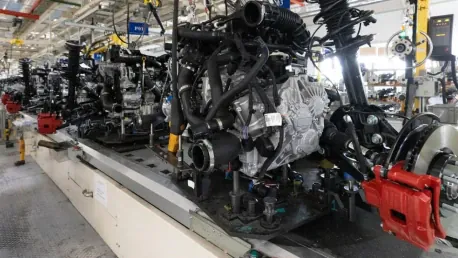The automotive industry is currently navigating a critical juncture as it transitions from traditional combustion engine vehicles to electric vehicles (EVs). This significant shift is being driven by escalating global pressure to adopt more environmentally-friendly technologies and increasingly stringent government regulations aimed at reducing carbon emissions. Despite the growing momentum, the industry confronts considerable challenges, particularly the scarcity of specialized skills necessary to facilitate this transformation. The ability of the automotive sector to overcome these obstacles will undeniably determine its future relevance and competitiveness in the rapidly evolving transport landscape.
The Urgency of Transitioning to Electric Vehicles
The global push towards sustainability has significantly amplified the pressure on the automotive industry to embrace electric vehicles. Governments around the world are enforcing stricter carbon emission regulations, with ambitious mandates like the United States’ directive to ensure at least 50% of all new vehicles sold by 2030 are zero-emission. This regulatory pressure is a crucial motivator for manufacturers to innovate and adapt swiftly. Failing to comply with these stringent standards could result in hefty fines and loss of market credibility. For manufacturers, the transition to EVs is not merely about adhering to regulations; it is also about staying competitive amidst a rapidly evolving market landscape.
Manufacturers are finding themselves compelled to offer electric alternatives as consumers increasingly demand environmentally-friendly options. With rising awareness about climate change and the environmental impact of fossil fuels, consumer preference is shifting towards cleaner, greener vehicle options. Companies that fail to adapt to these changing consumer preferences risk losing significant market share. The urgency for this transition is palpable. The future of the automotive sector hinges on its ability to effectively embrace and master EV manufacturing. Fostering innovation, advancing technological capabilities, and meeting evolving consumer demands are now imperative for success.
Addressing the Significant Skills Gap
One of the most formidable challenges in the shift to EVs is the substantial skills gap plaguing the industry. Traditional automotive manufacturers are grappling to acquire the specialized expertise indispensable for EV production, such as electric drivetrain engineering, advanced machine learning, and software development. This deficit in necessary skills is stifling their ability to innovate and remain competitive. Hence, there is an imperative need for a strategic approach to talent acquisition and development. Attempting to solely “hire their way out” of the problem may not prove effective in the long term.
To bridge this significant skills gap, companies must invest in systematic HR practices rather than just seeking quick fixes. A comprehensive HR approach involves skills-based recruiting, retaining key talent, reskilling for the future, and redesigning work processes to optimize production. By concentrating on building and nurturing talent from within, manufacturers can develop a workforce fortified to drive the EV revolution. Emphasizing employee development and fostering a culture of continuous improvement is critical. Manufacturers need to create robust learning and development programs that empower employees with the skills needed for emerging technologies.
The Role of New Technologies and Operating Models
The shift towards electric vehicles necessitates the adoption of new technologies and innovative operating models. Autonomous driving and advanced digital features have become prominent as the industry leans towards the concept of “computers on wheels.” This transformation requires expertise not only in traditional automotive engineering but also in software engineering, artificial intelligence (AI), and data science. The ability to integrate these cutting-edge technologies into vehicle manufacturing is paramount for success in this new era. Leading manufacturers are already excelling by prioritizing roles that drive technological and transformational excellence.
The changing landscape has also influenced operating models, with a discernible shift towards direct-to-consumer sales. The traditional dealership model is being reevaluated as companies seek more efficient ways to reach their customers. Direct sales allow manufacturers to build stronger relationships with consumers, gather valuable data, and provide a more personalized purchasing experience. By aligning their operating models with these new technologies, automotive companies can enhance their competitiveness and meet the evolving expectations of consumers. The industry must recognize that the integration of new technologies is not optional but essential for future success.
Strategic College Partnerships and Talent Development
Fostering strong partnerships with top educational institutions is an effective strategy for bridging the skills gap in the automotive industry. Collaborating with leading universities, particularly those with robust STEM (Science, Technology, Engineering, and Mathematics) programs, can ensure a steady pipeline of skilled graduates ready to contribute to the EV transition. These strategic partnerships facilitate access to cutting-edge research, innovation, and fresh talent, aligning with the industry’s need for advanced skills. By engaging with academia, manufacturers can also influence curriculum development to better align with industry requirements.
Developing tailored skills strategies is equally crucial for addressing the talent shortage. Manufacturers can leverage “adjacent skills” to create efficient recruitment and talent development plans. This approach involves identifying skill relationships and promoting from within, helping to develop robust learning programs that transition employees from redundant roles to those in demand. By mapping skills and employing AI to understand the capability landscape, companies can design structured career pathways that support effective talent transitions. This holistic approach ensures that the workforce remains adaptable and equipped to meet the evolving demands of the industry.
Investing in Systemic HR and Future Skills
Tackling issues like developing a robust EV infrastructure, ensuring affordable and reliable battery technology, and retraining the workforce are essential steps in this transformative journey. The success of this transition will play a critical role in determining how the industry evolves in the coming years, influencing not just economic outcomes but also environmental impacts and technological advancements.









